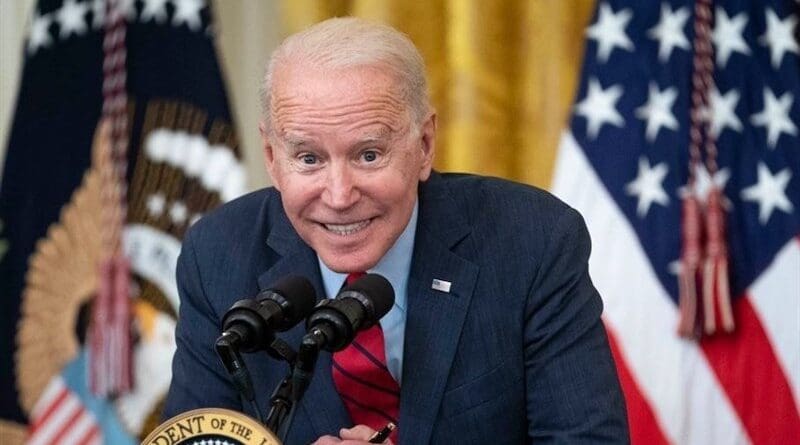Arab, Muslim Americans And Their Perception Of Biden Amidst The Gaza Conflict – OpEd
By Altaf Moti
The ongoing conflict in Gaza has ignited intense emotions and political divisions particularly among Arab and Muslim Americans. President Joe Biden’s handling of the situation has drawn heavy criticism with some viewing him as a steadfast supporter of Israel’s actions and others labeling him a “war criminal.” Let’s delve into the complexities of this issue.
The Exodus of Support
Since the start of the Israel-Hamas war, public polling has revealed a significant shift in sentiment among Arab and Muslim Americans. Many have abandoned President Biden expressing outrage over the Israeli bombardment of Gaza. This exodus, if sustained, could significantly impact Biden’s chances in the 2024 election especially in key swing states where he won by slim margins in 2020.
President Biden has consistently reiterated his support for Israel’s war on Hamas. He acknowledges the tragic civilian casualties in Gaza but refrains from applying public pressure to halt the bombings. His administration argues that Israel is acting within its right to defend itself, even as the death toll in Gaza continues to rise. Approximately 40% of Gaza’s residents are children under the age of 14, making the loss of life even more heartbreaking.
Calls for a “Humanitarian Pause”
Arab and Muslim Americans, along with progressive and pro-Palestinian Democrats, have repeatedly urged Biden to do more. They argue that his calls for a “humanitarian pause” fall short of addressing the crisis. The demand for aid delivery and civilian evacuation before resuming the siege remains unmet.
Progressive Discontent
Progressive Democrats, who have applauded Biden’s actions on climate, the economy and student debt find themselves at odds with his stance on Gaza. Waleed Shahid, a Democratic strategist associated with figures like Senator Bernie Sanders and Representative Alexandria Ocasio-Cortez, expressed disappointment. In an MSNBC op-ed, Shahid wrote, “Over the past few weeks, I’ve been inundated with messages from Muslim and Arab Americans… they’re done with the Democratic Party”.
As the conflict persists, Biden faces mounting criticism from younger progressives and Arab Americans. More than 100,000 voters in Michigan’s Democratic primary have voiced their discontent. While Biden has increased criticism of Israel’s actions, he continues to provide military aid. Striking a balance between supporting an ally and addressing humanitarian concerns remains a delicate task .
The Humanitarian Crisis: Food Shortages and Deaths
Beyond the political rhetoric, the crisis in Gaza has dire humanitarian consequences. Let’s explore the impact of food shortages and the tragic loss of life, particularly among children.
1. Malnutrition and Stunted Growth: The prolonged conflict disrupts essential services, including food distribution. Children in Gaza face malnutrition due to limited access to nutritious meals. Chronic malnutrition can lead to stunted growth, cognitive impairments, and weakened immune systems.
2. Dependency on Aid: The majority of Gaza’s population relies on humanitarian aid for sustenance. The destruction of infrastructure including farms and markets, exacerbates food scarcity. Families struggle to provide basic meals for their children.
3. Psychological Toll: Hunger affects not only physical health but also mental well-being. Children experience anxiety, fear, and trauma as they witness their families struggle to put food on the table. The uncertainty of when their next meal will come compounds their distress.
Children as the Most Vulnerable
1. Child Mortality: The loss of innocent lives is heartbreaking. Children are particularly vulnerable to hunger-related illnesses. Malnutrition weakens their immune systems, making them susceptible to infections and diseases.
2. Psychosocial Impact: Witnessing violence, losing family members, and living in constant fear takes a toll on children’s mental health. The trauma they experience can have lifelong consequences.
U.S. Response and Criticisms
1. Verbal Statements: While the U.S. has expressed concern over civilian casualties, many argue that mere verbal statements are insufficient. Critics believe stronger action is necessary to protect innocent lives.
2. Air-Dropping of Food Packages: The limited air-dropping of food packages falls short of addressing the scale of need. It’s a Band-Aid solution to a deep wound.
3. Political Calculations: Some perceive the U.S.’s actions as a delicate balancing act. The longstanding alliance with Israel influences its response. However, this approach risks alienating Arab and Muslim communities.
The Internal Game
1. Complex Geopolitics: The conflict intertwines with regional politics, alliances, and historical grievances. The U.S. faces pressure from various stakeholders including domestic interest groups and international partners.
2. Navigating Diplomacy: President Biden treads carefully, balancing humanitarian concerns with strategic interests. The delicate dance between supporting Israel and advocating for peace is fraught with challenges.
In this high-stakes scenario, the U.S. must grapple with moral imperatives, geopolitical realities and the urgent needs of innocent civilians. The 2024 election looms, and the exodus of support from this crucial demographic could shape its outcome.
In the end, the question remains: Can Biden reconcile his commitment to Israel with the urgent need for peace and justice in Gaza? Only time will tell, but the eyes of Arab and Muslim Americans are watching closely.

